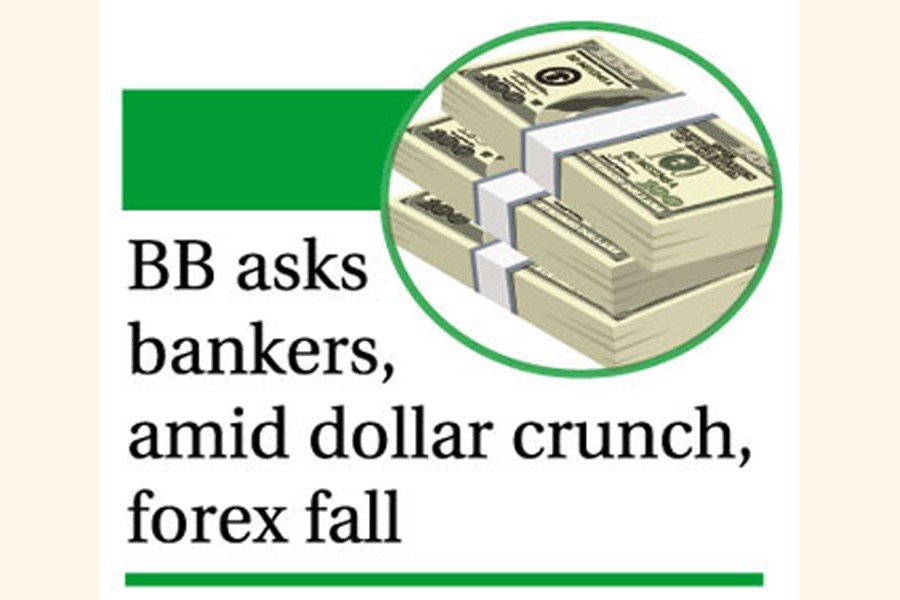The central bank asks top bankers to jumpstart moves to augment remittance inflow immediately for ensuring macroeconomic stability of Bangladesh, evidently amid forex fall.
Under the crash course charted in a meeting Wednesday, top executives of the private commercial banks (PCBs) have been instructed to communicate the expatriate Bangladeshis about enhanced cash incentives on remittance receipts through massive awareness campaigns both at home and abroad.
The instructions were given during a courtesy call of the newly elected leaders of the Association of Bankers, Bangladesh (ABB) with Bangladesh Bank (BB) Governor Fazle Kabir.
A nine-member delegation, led by newly elected chairman of ABB Selim R. F. Hussain, met the BB governor, accompanied by three deputy governors, at the central bank headquarters in Dhaka.
Earlier on January 01, the government increased cash incentives on inward remittances to 2.5 per cent from 2.0 per cent earlier to encourage the expatriates to send their hard-earned money through the formal banking channel.
The latest BB initiatives come against the backdrop of a falling trend in the flow of inward remittances in recent months as money transfers through informal channels such as hundi might have returned with the ease of pandemic restrictions.
Meanwhile, the remittance inflow dropped more than 20 per cent to $10.24 billion during the July-December period of the current fiscal year (FY), 2021-22, from $ 12.94 billion in the same period of FY'21, the BB data show.
At the same meeting, the central bank also asked the ABB to sit with the Bangladesh Foreign Exchange Dealers' Association (BAFEDA) for bringing uniformity in quoting foreign-currency exchange rates to the overseas exchange houses for receiving higher remittances.
Such exchange houses are engaged in gathering and sending money to Bangladesh.
The latest BB instructions come after detecting that most of the banks distorted the foreign-exchange (forex) market through offering higher rates to the overseas exchange houses, in a rat race for fetching the trading-currency dollar.
"We'll help both the ABB and BAFEDA in this connection, if necessary," a senior BB official told the FE after the meeting was over.
Actually, the banks are now quoting high rates to the overseas exchange houses to attract more inward remittances and these rates often exceed the inter-bank forex-market rates, according to market insiders.
Earlier, the central bank had asked the bankers to quote foreign- currency exchange rates to the overseas exchange houses after applying due diligence and considering the situation on the inter-bank forex market.
The ABB leaders emphasized reducing gap between formal banking- channel exchange rate of the US dollar against the Bangladesh Taka (BDT) and kerb market to encourage the expatriates to send their money through official channel.
"Lower gap between two rates will help expedite the flow of inward remittance through formal banking channel," a senior member of the ABB told the FE while replying to a query.
Currently, there is a gap of over Tk 5.0 between the exchange rate of cash dollar on the open market, known as kerb market, and telegraphic transfer (TT) clean rate for remitters.
The banks offered an average rate of Tk 85.05 to the remitters for TT on Wednesday, according to the daily report of Bangladesh Foreign Exchange Dealers' Association (BAFEDA).
On the other hand, the US currency was traded at around Tk 91 on the informal kerb market on the day as demand for the greenback has gone up recently.
Talking to the FE, a senior treasury official of a leading PCB said the BAFEDA may monitor the rates offered by the commercial banks to the overseas exchange houses, with BB's active support.
He also said the banks are quoting exchange rates prepared by their remittance departments to the overseas exchange houses rather than relying on the treasury rates.
"But the remittance departments are neither equipped nor empowered to quote such rates," says the private banker, adding that such practice is causing exchange-rate anomaly among banks as well as on the inter-bank forex market.
He also says the banks should follow the central bank's core-risk foreign-exchange guidelines before offering such rates to the overseas exchange houses.


